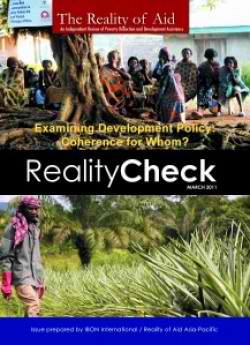About the Issue
Current international concern on policy coherence comes from the recognition that the enormous range of development policies implemented or proposed is motivated by diverse agendas and interests of various actors whose concerns and priorities may not be consistent or even intersect. This incoherence results in contradicting policies that have tremendous impacts on people especially the poor in developing countries.
Policy coherence for development (PCD) is often confused with and narrowed down to harmonization and coordination, but PCD covers the whole policy environment that ensures economic relations are not damaging as well as country ownership of development programs and policies. As such, PCD must be guided by principles of human rights, gender and social equity, ecological sustainability, solidarity, and mutual accountability to achieve development effectiveness.
Contents
- The Politics of Policy Coherence
- Policy Coherence and Development Effectiveness
- Policy Incoherence and the Philippine CCT Program
- The Question of Representation
- Negative ODA Flows: Falling into the Debt Trap
Acknowledgements
This Reality Check was made possible with valuable contributions from Pedram Pirnia of the New Zealand Council for International Development (NZCID) and Arnold Padilla.
Cover Photos by:
Poland MFA
IRIN
Inside Photos by:
Poland MFA
IBON Foundation
Philip Brookes
World Bank – Philippines
Marc Reil Gepaya
IRRI Images
The Advocacy Project
IRIN
Simon Oosterman
Cover Design and Layout by: Florenio Bambao

